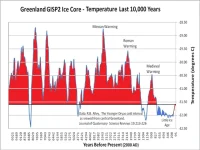- Joined
- Jan 25, 2012
- Messages
- 49,509
- Reaction score
- 15,383
- Location
- Texas
- Gender
- Male
- Political Leaning
- Conservative
Yes you kind of did!I never claimed that there is consensus that human caused global warming will cause mass extinctions. Science can't determine with any degree of certainty what will happen in the future.
There is scientific consensus that significant climate change causes disruptions in the ecosystems of the area which can lead to extinctions. This is established science and we have seen it happen.
So IF human caused global warming causes significant climate change in the future, (and it already has in the arctic) then in that hypothetical scenario it would be reasonable to be worried about subsequent future ecosystem disruptions that might result from this climate change.
So it is reasonable to include this likely scenario on our calculations about our environmental impact going forward. Better safe than sorry.
In post #103 you had several links to mass extinctions, and then in post# 113,
you defended the statement saying,
If you think some other or additional scientific consensus exists besides the one spelled out by NASA, then you need to cite a source?To reject the consensus of 99% of scientists in favor of 1% that you know nothing about requires an enormous amount of faith in a handful of people you've never met and an enormous amount of cynicism about the scientific method and the motives of humans in general.

